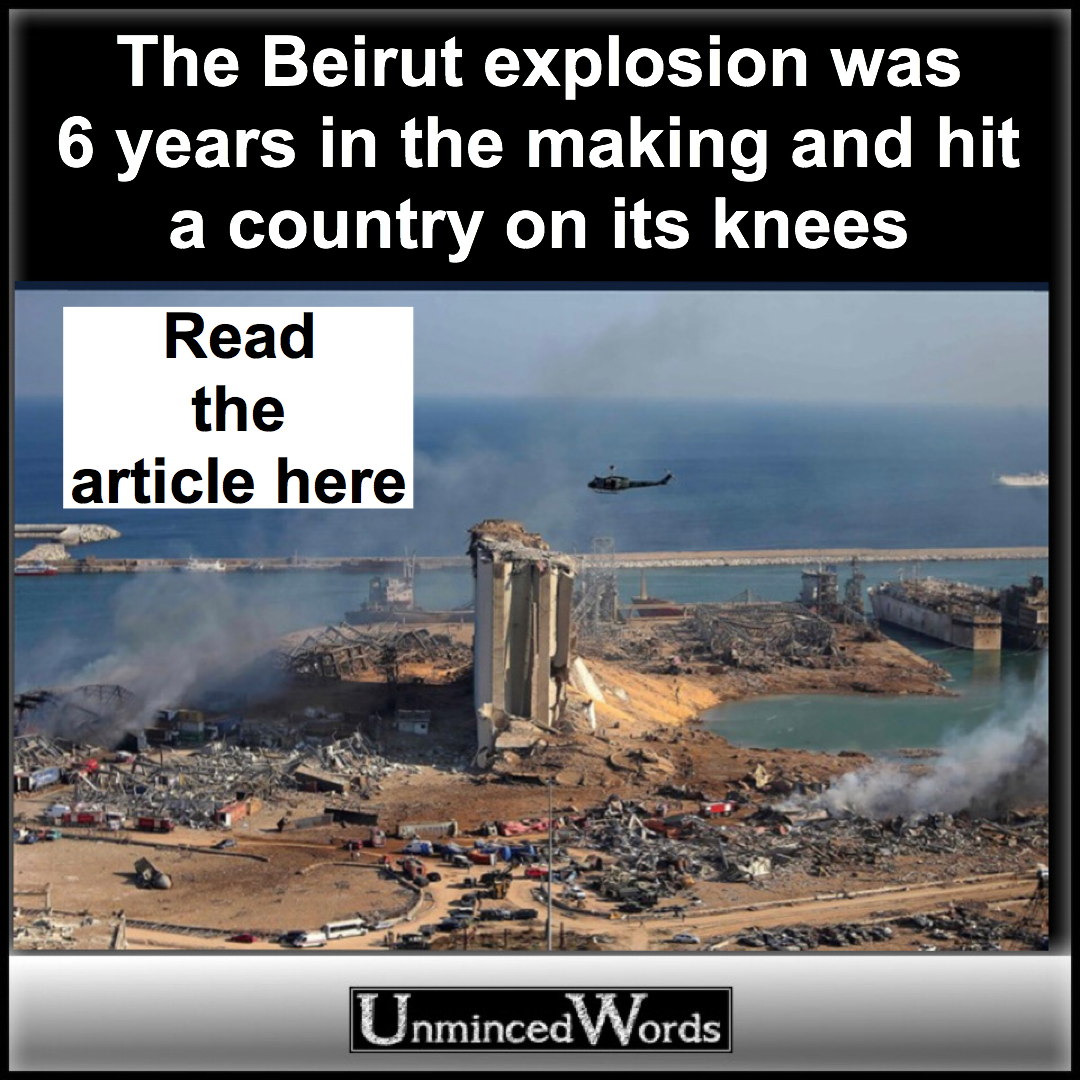
The Beirut explosion was 6 years in the making and hit a country on its knees
The explosion that gouged a crater in Beirut's portside and sent a devastating shockwave through the city would have been a catastrophe for any country.
But it was especially cruel timing for Lebanon — where it killed at least 135 people, injuring more than 4,000 and making another 250,000 homeless. It came right when the country is already buckling under a stack of economic, political and healthcare crises.
The city is no stranger to conflict. On social media people shared photos of the red mushroom cloud hanging over the city following Tuesday's blast, alongside eerily similar images from the country's civil war 1975-1990 and the 2006 conflict between Hezbollah and Israel.
But all the early evidence suggests it was not an attack — despite the unsubstantiated comments by President Donald Trump and numerous conspiracy theorists online. Rather it appears to be a disaster caused or at least enabled by the very forces of negligence and perhaps even corruption that have been responsible for bringing the country to its knees.

The explosion was triggered when a warehouse fire ignited 2,750 tons of ammonium nitrate, a chemical used in fertilizer and bombs, according to Lebanese Prime Minister Hassan Diab.
He said the stockpile had been stored at the port for six years without any "preventive measures" to protect it. Other officials said they have tried to sound the alarm about this deadly chemical being quietly stored in the heart of a city of more than 2 million people.
The head of Beirut port and the head of customs both said Wednesday that several letters were sent to the judiciary asking for the dangerous material be removed, but no action was taken.
"We requested that it be re-exported but that did not happen," Badri Daher, director general of Lebanese Customs, told broadcaster LBCI. "We leave it to the experts and those concerned to determine why.
NBC News attempted to contact Albert Serhan, Lebanon's former justice minister until, to ask him about the allegatins but did not get a response.
‘The ship couldn’t take it’
The ammonium nitrate arrived in fall 2013 on a Russian-owned cargo ship, the Rhosus, the ship's then-captain, Boris Prokoshev, told NBC News. It was en route from the Georgian Black Sea port of Batumi to Mozambique where it was to be used as fertilizer, he said.
It stopped off in Beirut but was impounded for safety reasons because it was overloaded and listing, Prokoshev said.
"The ship couldn't take it," he said.
The ship's Russian owner, Igor Grechushkin, abandoned the ship, refusing to pay docking fees, fines, and even salaries and food for the crew, according to the captain and Natalia Sokolova, a representative for the Seafarers Union of Russia, which represented the crew during its dispute with the owner at the time.
NBC News tried but was not able to reach Grechushkin for comment.

Authorities in Beirut kept the crew aboard for 11 months to tend to the cargo, according to the captain, who said they felt "trapped" on board, and the labor union representative Sokolova.
"The Beirut port authority would not give them permission to abandon a ship carrying this type of cargo," Sokolova said. "In the end, a court seized the vessel to sell it as a means to pay off the ship owner's debts, and a port agent found locals to unload the cargo and the crew went home."
Beirut Governor Marwan Abboud backed up this account, telling the country's LBCI television station that the chemical was kept in the port under "judicial order" and that "there was nobody who took the responsibility to make a decision to remove it."
'Incomprehensible'
Various Lebanese leaders have promised to bring those responsible to justice.
The presidency tweeted that anyone who "managed the affairs" of the chemical, guarded it or "examined its file" since June 2014 would be put under house arrest. Diab, the prime minister, said that he "will not rest until we find the person responsible for what happened."
But many residents and commentators see the disaster as symptomatic if not directly caused by the general state of upheaval into which the country has slid.
It is currently suffering its worst economic crisis in its modern history, with prices, unemployment and hunger skyrocketing and its currency, the lira, plummeting.
Anti-government protests in recent months have called for a change to what they see as decades of corrupt leadership, with sectarian politics and patronage networks enriching the elite and creating grave inequality. Hezbollah, an Iranian proxy officially designated a terrorist organization by the U.S., is a political group with unrivaled influence in the government.

The country was already struggling to cope with the 1.5 million refugees who have fled there from the war in neighboring Syria. These displaced people now make up 30 percent of its population — the highest proportion in the world.
Add to this the coronavirus pandemic, which has shuttered businesses, left thousands unemployed and threatens to overwhelm the country's beleaguered health system.
Tuesday's explosion ripped through a city on its knees. Not only has it wrought widespread damage, it has cripped the country's main port and immolated a month of grain reserves.
Human rights groups were among those to call for an international team to lead the inquiry into how this could have happened.
"The level of devastation in Beirut is incomprehensible, and the responsible authorities should be held accountable," Aya Majzoub, Lebanon researcher at Human Rights Watch, said in a statement.
"Given the Lebanese authorities’ repeated failure to investigate serious government failings and the public’s distrust of government institutions," Majzoub added, "an independent investigation with international experts is the best guarantee that victims of the explosion will get the justice they deserve."
Alexander Smith reported from London, Matthew Bodner reported from Moscow, Charlene Gubash reported from Cairo and Mustafa Kassem reported from Beirut. Reuters contributed to this report.
#Beirut #BeirutExplosion #middleEastNews #Lebanon #news #worldnews























